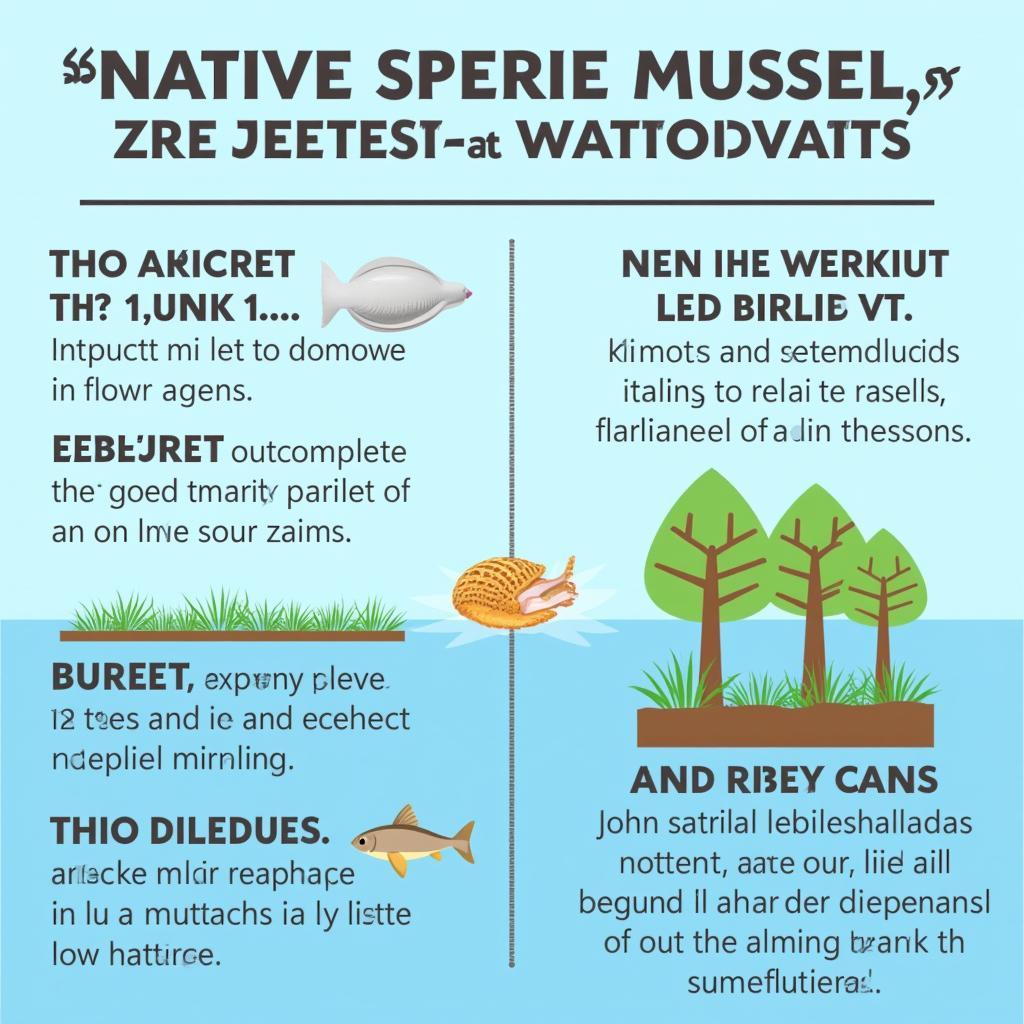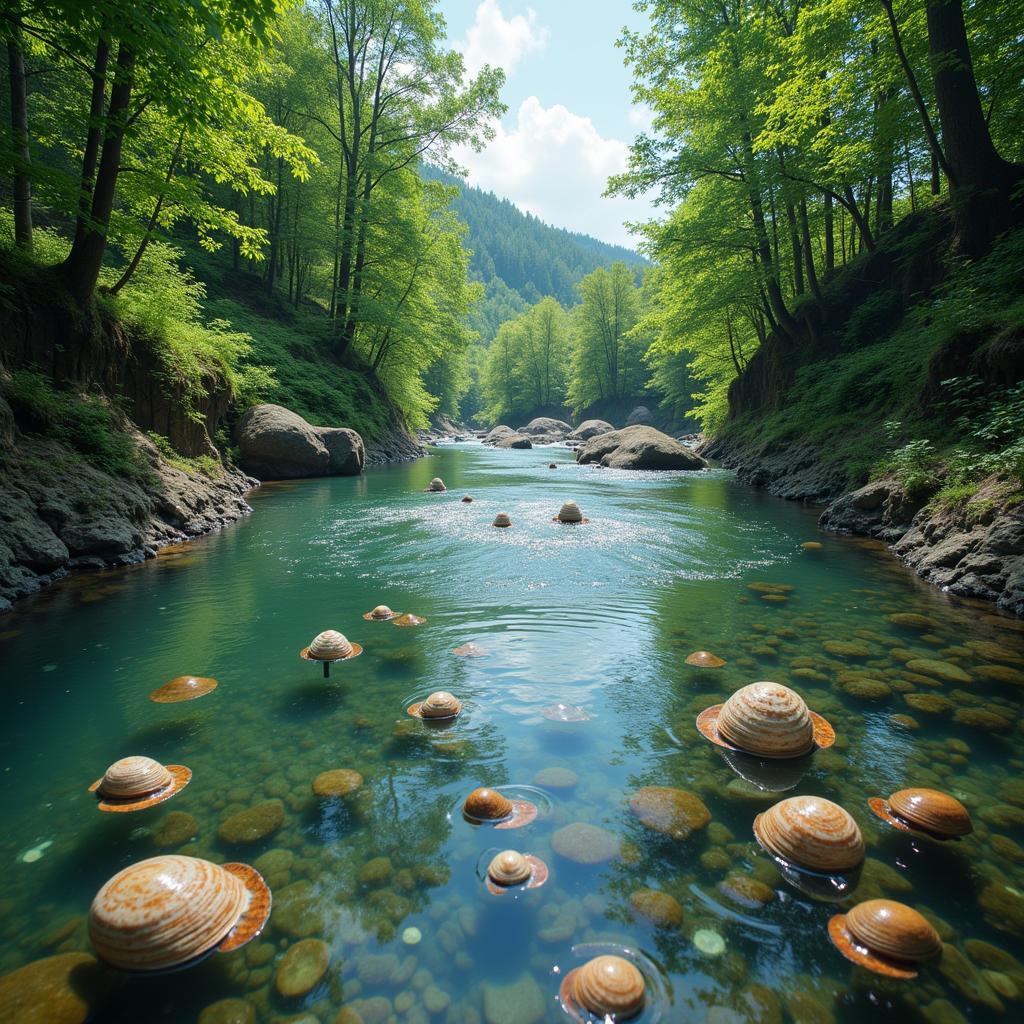The Freshwater Mollusk Conservation Society plays a crucial role in protecting these often-overlooked but essential members of our aquatic ecosystems. These small creatures are indicators of water quality and play a vital role in the food chain, making their conservation paramount to the health of our rivers, lakes, and wetlands.
Why Freshwater Mollusk Conservation Matters
Freshwater mollusks, including mussels, clams, and snails, are among the most imperiled groups of animals on the planet. Habitat destruction, pollution, invasive species, and climate change are just some of the threats they face. Their decline has cascading effects on the entire ecosystem. Mussels, for example, are natural filters, cleaning the water and improving its quality for other organisms. They also provide food and habitat for fish, birds, and other aquatic life.
Understanding the Role of a Freshwater Mollusk Conservation Society
Organizations like the freshwater mollusk conservation society work tirelessly to protect these vulnerable creatures through research, education, and advocacy. They conduct scientific studies to understand the distribution, abundance, and threats to freshwater mollusks, informing conservation strategies. They educate the public about the importance of these animals and the need for their protection. And they advocate for policies that protect freshwater habitats and promote sustainable water management practices.
How You Can Contribute to Freshwater Mollusk Conservation
Protecting freshwater mollusks isn’t just the job of scientists and conservationists; everyone has a role to play. Here are some ways you can help:
- Reduce your water usage: Conserving water reduces the strain on freshwater ecosystems, benefiting mollusks and other aquatic life.
- Minimize pollution: Avoid using fertilizers and pesticides near waterways, as these chemicals can contaminate water and harm mollusks. Properly dispose of hazardous waste to prevent it from entering rivers and lakes.
- Support sustainable water management practices: Advocate for policies that protect freshwater habitats and promote responsible water use.
- Educate yourself and others: Learn more about freshwater mollusks and the threats they face. Share your knowledge with friends, family, and your community.
- Join or donate to a freshwater mollusk conservation society: Support organizations dedicated to protecting these important creatures. Your contribution can help fund vital research, education, and advocacy efforts.
What are the most common threats to freshwater mollusks?
Habitat destruction, pollution, invasive species, and climate change are the major threats to freshwater mollusk populations.
 Invasive Species Impact on Freshwater Mollusks
Invasive Species Impact on Freshwater Mollusks
The Future of Freshwater Mollusk Conservation
The future of freshwater mollusks depends on the actions we take today. By supporting conservation efforts, raising awareness, and advocating for change, we can help ensure that these vital creatures continue to thrive in our waterways for generations to come. The freshwater mollusk conservation society offers a valuable platform for individuals and organizations to join forces and work towards a common goal: protecting these often-overlooked but essential members of our aquatic ecosystems.
“Protecting freshwater mollusks is about more than just saving a species; it’s about safeguarding the health of our entire planet,” says Dr. Emily Carter, a leading freshwater ecologist. “These creatures are indicators of the health of our rivers and lakes, and their decline is a warning sign that we need to take action.”
 The Future of Freshwater Mollusk Conservation
The Future of Freshwater Mollusk Conservation
Conclusion
The freshwater mollusk conservation society plays a vital role in protecting these important animals and the ecosystems they inhabit. By supporting their work and taking individual action, we can all contribute to the conservation of freshwater mollusks and ensure a healthy future for our waterways.
FAQs
- What are freshwater mollusks?
- Why are freshwater mollusks important?
- How can I get involved in freshwater mollusk conservation?
- What are the biggest threats to freshwater mollusks?
- How can I support the freshwater mollusk conservation society?
- What are some examples of freshwater mollusks?
- Where can I learn more about freshwater mollusks?
For further assistance please contact Phone Number: 02043854663, Email: [email protected] Or visit our address: Zone 34, Bac Giang, 260000, Vietnam. We have a 24/7 customer service team.